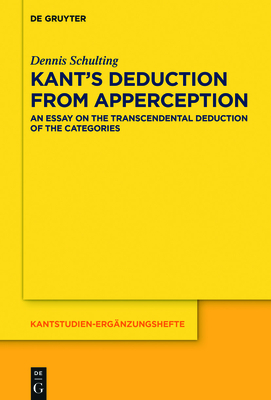Kant's Deduction From Apperception

Kant's Deduction From Apperception
In focusing on the systematic deduction of the categories from a principle, Schulting takes up anew the controversial project of the eminent German Kant scholar Klaus Reich, whose monograph "The Completeness of Kant's Table of Judgments" made the case that the logical functions of judgement can all be derived from the objective unity of apperception and can be shown to link up with one another systematically. Common opinion among Kantians today has it that Kant did not mean to derive the functions of judgement, and accordingly the categories, from the principle of apperception. Schulting challenges this standard view and aims to resuscitate the main motivation behind Reich's project. He argues, in agreement with Reich's main thesis about the derivability of the functions of judgement, that Kant indeed does mean to derive, in full a priori fashion, the categories from the principle of apperception. Schulting also shows that, given the general assumptions of the Critical philosophy, Kant's derivation is successful and that absent an account of the derivation of the categories from apperception, the B-Deduction cannot really be understood. New edition. First published 2012 as "Kant's Deduction and Apperception. Explaining the Categories (Palgrave Macmillan)
In focusing on the systematic deduction of the categories from a principle, Schulting takes up anew the controversial project of the eminent German Kant scholar Klaus Reich, whose monograph "The Completeness of Kant's Table of Judgments" made the case that the logical functions of judgement can all be derived from the objective unity of apperception and can be shown to link up with one another systematically. Common opinion among Kantians today has it that Kant did not mean to derive the functions of judgement, and accordingly the categories, from the principle of apperception. Schulting challenges this standard view and aims to resuscitate the main motivation behind Reich's project. He argues, in agreement with Reich's main thesis about the derivability of the functions of judgement, that Kant indeed does mean to derive, in full a priori fashion, the categories from the principle of apperception. Schulting also shows that, given the general assumptions of the Critical philosophy, Kant's derivation is successful and that absent an account of the derivation of the categories from apperception, the B-Deduction cannot really be understood. New edition. First published 2012 as "Kant's Deduction and
PRP: 190.40 Lei
Acesta este Prețul Recomandat de Producător. Prețul de vânzare al produsului este afișat mai jos.
152.32Lei
152.32Lei
190.40 LeiIndisponibil
Descrierea produsului
In focusing on the systematic deduction of the categories from a principle, Schulting takes up anew the controversial project of the eminent German Kant scholar Klaus Reich, whose monograph "The Completeness of Kant's Table of Judgments" made the case that the logical functions of judgement can all be derived from the objective unity of apperception and can be shown to link up with one another systematically. Common opinion among Kantians today has it that Kant did not mean to derive the functions of judgement, and accordingly the categories, from the principle of apperception. Schulting challenges this standard view and aims to resuscitate the main motivation behind Reich's project. He argues, in agreement with Reich's main thesis about the derivability of the functions of judgement, that Kant indeed does mean to derive, in full a priori fashion, the categories from the principle of apperception. Schulting also shows that, given the general assumptions of the Critical philosophy, Kant's derivation is successful and that absent an account of the derivation of the categories from apperception, the B-Deduction cannot really be understood. New edition. First published 2012 as "Kant's Deduction and Apperception. Explaining the Categories (Palgrave Macmillan)
In focusing on the systematic deduction of the categories from a principle, Schulting takes up anew the controversial project of the eminent German Kant scholar Klaus Reich, whose monograph "The Completeness of Kant's Table of Judgments" made the case that the logical functions of judgement can all be derived from the objective unity of apperception and can be shown to link up with one another systematically. Common opinion among Kantians today has it that Kant did not mean to derive the functions of judgement, and accordingly the categories, from the principle of apperception. Schulting challenges this standard view and aims to resuscitate the main motivation behind Reich's project. He argues, in agreement with Reich's main thesis about the derivability of the functions of judgement, that Kant indeed does mean to derive, in full a priori fashion, the categories from the principle of apperception. Schulting also shows that, given the general assumptions of the Critical philosophy, Kant's derivation is successful and that absent an account of the derivation of the categories from apperception, the B-Deduction cannot really be understood. New edition. First published 2012 as "Kant's Deduction and
Detaliile produsului









